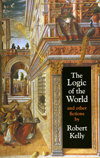The Logic of the World
Entering my neighborhood from a different direction for the first time, I became disoriented, unable to find my building right away. Then, there it was! And I suddenly had a new "feel" for the place. Experiencing the familiar from a new perspective can bring disorientation that, fading, leaves an enhanced understanding. In much the same way, Robert Kelly's fiction shows us our familiar world from a new perspective, and expands our understanding of this life we live.
Entering my neighborhood from a different direction for the first time, I became disoriented, unable to find my building right away. Then, there it was! And I suddenly had a new "feel" for the place. Experiencing the familiar from a new perspective can bring disorientation that, fading, leaves an enhanced understanding. In much the same way, Robert Kelly's fiction shows us our familiar world from a new perspective, and expands our understanding of this life we live.
Kelly steps clear of established forms, constructing and sequencing images, sometimes rather whimsical but always remarkable, in such a way to hang lightly, like freshly washed kerchiefs, from a thin, absolutely unpredictable story line – creating not just a story but a work of art.
Kelly's new fiction collection, The Logic of the World, begins with "Forty Square Meters," about two lovers "in the old part of the city. The street was so old it had been there when Sadi-Carnot was assassinated, when the saxophone was invented, when Berlioz swept through the avenues openly crying for his lost Irish love." They fill their apartment with impossible keepsakes:
One meter contained the whole of Mount Kilimanjaro, which came from Africa. It was so high there was always snow on top of it, right up to almost touching the ceiling. When it got hot and stuffy in the apartment they would climb up the gentle slopes of the mountain till they found a cool grotto, where lush vegetation welcomed them, and they listened to the springs gurgling.
Right next to that mountain, a square meter contained a small meadow on the slopes of the Donnersberg, not far from the Rhine. On it a few dozen cows.
Their tale moves through itself like a streetcar that shows tourists a wonder at every turn, but which only transports residents back and forth to shopping or work. The piece runs its course and we exit, feeling a great satisfaction, but perhaps not recalling just what happened. Kelly unveils a world both believable and irrational.
He ties knots in time and reality. In "The Example of the Hawk," a woman seduced by the waters of a fountain is protagonist in a story read by a man of the theater; his own concepts of theater are brought to life, and seduce him. He spends the rest of his days as an itinerant, bringing his own theater to villages across the land. When his life has run its course, the fountain woman, still young, finds and comforts him.
Kelly mines tales rooted in pre-English, retrieving bits and pieces, examining relationships among men and women and their gods. He re-constructs the myth about Andromeda and Perseus to explore their sexual motivations.
The collection's title piece, "The Logic of the World," features a knight, a leper and a dragon. The knight, of course, is Parsival, from the Arthurian legend and its ancient German predecessor. The dragon becomes a teacher and benefactor for the knight, instructing him in – yes, the logic of the world. Perplexed, Parsival draws his sword.
"O little one," the dragon says, "Don't you realize you have already slain me," disappearing into thin air.
"You will listen to me in your head again. You will realize that, just like the cowardly creature your traditions claim I am, I have rushed into hiding. You will slowly realize that I have hidden myself in the snuggest cavern of them all, deep inside your mind, and that you will never altogether silence me."
Kelly includes a bit of blarney, too. In "Saving the Moon," a gypsy convinces a whole village to gather up money for him to give to an old Indian shaman (who never actually appears in the village nor the story) in order that he might save the moon from disappearing.
Kelly's stories are interspersed by very short (flash?) pieces: In one, a man has gradually built an imaginary world to his liking. When it's finished he slips into it, leaving his dead body.
Kelly includes a painfully exact description of a room and all – all – of its contents, and he examines the underpinnings of Don Juan, and of Faustus. He ends the collection with a piece about "Kafka's brother, who whispers big plans, who guides the writer's hands toward plausible solutions and away from the structures of thought and poetry."
"So it is to escape Kafka's brother," Kelly concludes, "that some writers on their deathbeds cry out, Max, burn all my work."
This is a collection which, for its unique perspectives and Kelly's skill in presenting them, may well end up not on your shelf of interesting reads, but instead taking its place upon your shelf of indispensable reference books.





